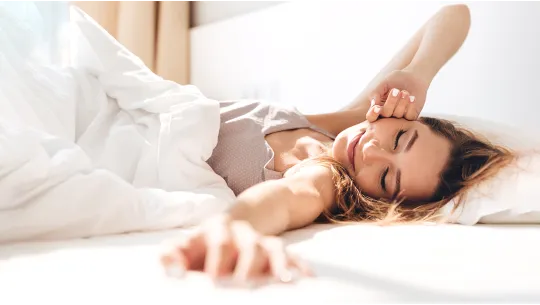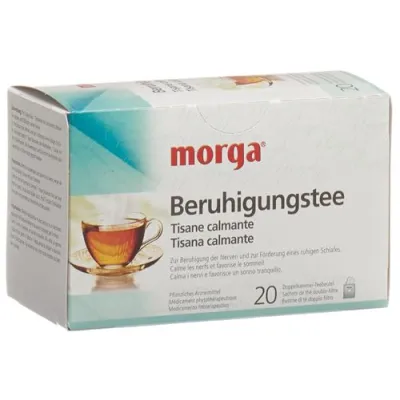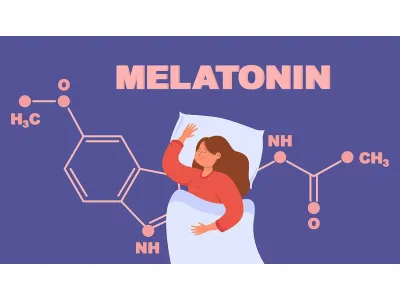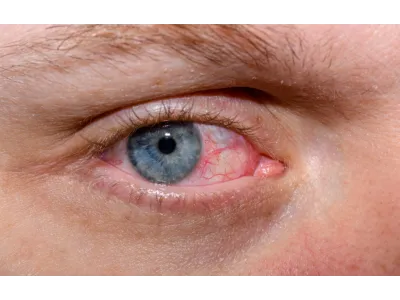Natural Remedies for Enhancing Sleep Quality

Sleep disorders disrupt regular sleep patterns, cause distress, and affect health and quality of life. These conditions range from insomnia to more severe conditions such as sleep apnea. Medicinal herbs are effective in the treatment of sleep disorders, because they help to relieve tension, stress and lead to a quick fall asleep.
The Sleep Cycle
The sleep cycle consists of several stages, each of which has unique characteristics and functions. It is classified into REM sleep and non-REM sleep, which includes three stages:
Not a fast sleep
- Stage 1 (N1): This is the lightest stage of sleep, the transitional phase where you drift off to sleep. It lasts for several minutes, during which time the heartbeat, breathing and eye movements slow and the muscles relax with periodic twitches.
- Stage 2 (N2): When you move into stage 2, your body goes into a more depressed state, followed by a drop in heart rate and body temperature. This stage is important for general rest and constitutes a significant part of the total sleep time.
- Stage 3 (N3): Often referred to as deep sleep, is important for physical recovery, strengthening the immune system, and releasing growth hormone. During N3, it is harder to wake you up, and if you do wake up, you may feel disoriented for a few minutes.
Fast sleep
After the non-REM sleep stages, you enter REM sleep, which occurs about 90 minutes after falling asleep. Most dreaming occurs in this phase, which is characterized by rapid eye movement, increased brain activity, and muscle relaxation to a near-paralyzed state that prevents you from fulfilling your dreams. REM sleep is important for cognitive function, memory consolidation, learning and emotional regulation.
A healthy sleep schedule is very important for many reasons. It affects both physical and mental health. This is why healthy sleep is important:
- Cognitive functions: Sufficient sleep is essential for cognitive processes such as memory retention, learning, problem-solving skills, and creativity.
- Emotional Well-Being: Sleep affects your mood. Lack of sleep leads to irritability, stress and increased susceptibility to mental disorders such as depression and anxiety.
- Physical health: Sleep is involved in the healing and restoration of the heart and blood vessels. This is linked to the prevention of chronic diseases such as heart disease, diabetes and obesity. Proper sleep also supports the growth and development of children and adolescents.
- Immune System: Getting enough sleep strengthens your immune system, making you less susceptible to infections and illnesses.
A consistent sleep schedule should be established and maintained to help synchronize the body's internal clock and improve sleep quality. This means going to bed and waking up at the same time every day, even on weekends. Establishing a bedtime routine, providing a comfortable sleep environment, and avoiding stimulants such as caffeine and electronics before bed also contribute to healthy sleep patterns.
Common Sleep Disorders
Sleep disorders are a group of conditions that affect the ability to sleep normally. These sleep disturbances affect a person's quality of life, lead to health problems, mood disorders and reduced productivity. The most common sleep disorders are insomnia, sleep apnea, and restless legs syndrome (RLS).
- Insomnia: The most common sleep disorder, characterized by difficulty falling asleep, staying asleep, or both despite having the ability to do so. People with insomnia experience dissatisfaction with their sleep and usually report one or more of the following symptoms: fatigue, low energy, difficulty concentrating, mood disorders, and decreased performance at work or school. Insomnia is classified into two types: acute, which is short-term and often triggered by stress or traumatic events, and chronic, which lasts a month or longer.
- Sleep Apnea: People with untreated sleep apnea repeatedly stop breathing during sleep, sometimes hundreds of times. This means that the brain - and the rest of the body - is not getting enough oxygen. There are two types of sleep apnea: obstructive sleep apnea (OSA), the more common form, which occurs when the throat muscles relax, and central sleep apnea, which occurs when the brain does not send the correct signals to the muscles that control our breathing. Symptoms include loud snoring, pauses in breathing during sleep, sudden awakenings accompanied by gasping or suffocation, morning headaches, and daytime sleepiness.
- Restless legs syndrome (RLS): A neurological disorder characterized by an uncontrollable urge to move the legs, usually due to discomfort. It happens in the evening or at night when you are sitting or lying in bed. Movement temporarily relieves discomfort. RLS can start at any age and usually gets worse with age. This disrupts sleep, leads to daytime sleepiness and makes traveling difficult.
The importance of treatment
If left untreated, these sleep disorders can have serious negative consequences for health and quality of life. Insomnia leads to or exacerbates mental health problems such as depression and anxiety. Sleep apnea increases the risk of high blood pressure, heart attack, stroke, obesity, and diabetes. Restless legs syndrome seriously affects the quality of a person's sleep, leading to daytime fatigue and mood swings. Bring your attention to Sidroga Sleep and Nerve Tea, a tea for sleep and nerves that contains dried and finely ground valerian root, lemon balm leaves, passionflower herb and peppermint leaves. Tea is used to support mild restlessness, nervousness and sleep disorders.
Treatment depends on the type and severity of the sleep disorder, but includes lifestyle changes, surgery (for sleep apnea), sleep tablets, and behavioral therapy. Since the causes and symptoms of sleep disorders are very different, when starting to take sleeping drugs, you should consult a doctor for diagnosis and an individual treatment plan.
Herbs for Sleep Disorders
Herbal remedies have been used for centuries to treat many diseases, including sleep disorders. Many people treat insomnia and other sleep-related problems with the help of medicinal herbs.
- Valerian root: one of the most famous herbs for sleep disorders. It improves the quality of sleep and makes it easier to fall asleep, and it also increases the level of a neurotransmitter called gamma-aminobutyric acid (GABA) in the brain, which has a calming effect.
- Chamomile: A very popular herbal remedy for sleep problems, taken as a tea. Chamomile contains apigenin, an antioxidant that binds to receptors in the brain and promotes sleepiness, as well as reducing insomnia.
- Lavender: Studies show that inhaling the scent of lavender before bed improves sleep quality, especially for those who suffer from mild insomnia or anxiety. Lavender oil is also used in a diffuser or applied to pillows to help you sleep.
- Melissa: often used in combination with valerian, chamomile or hops, reduces anxiety and improves sleep. Melissa works by increasing GABA levels in the brain, similar to valerian root.
Bring your attention to AQUILEA Relax Kaps, a natural food supplement that helps you relax and reduce stress. Contains natural plant extracts that have been clinically tested for their ability to promote relaxation and sleep, namely Melissa officinalis, Passionflower incarnate, Escholtia Californian, L-Tryptophan, Vitamin B6. Morga Beruhigungstee also has a very good composition, which consists of chamomile flowers (40%), lavender flowers (20%), lemon balm leaves (15%), peppermint leaves (15%), bitter orange peel (10%).
Morga calming tea 20 bags 1.3 g
Product Name: Morga Calming Tea 20 Bags 1.3 g Brand / Manufacturer: Morga Experience the perfect blend of tranquility and taste with Morga Calming Tea. This unique blend of calming herbs is designed to soothe your senses and support relaxation. Packaged in convenient tea bags, each containing 1.3 g of carefully selected herbs, this tea is not just a beverage, but a pathway to peace. Features: Each tea bag contains 1.3 g of a unique blend of calming herbs. Easy-to-use tea bags for convenience and simplicity. 20 tea bags per box, providing you with a generous supply. Produced by Morga, a reputable brand known for its high-quality herbal products. Benefits: Helps soothe your senses and supports relaxation. Offers a natural solution to stress and tension. Can be enjoyed at any time of the day or night for a calming ritual. The perfect companion for meditation, yoga, or just winding down after a long day. Use Cases: Drink Morga Calming Tea as part of your bedtime routine to promote restful sleep. Enjoy a cup in the afternoon as a stress-reducing break from work or study. Use it as a natural remedy for occasional stress and tension. Serve it to guests as a soothing beverage that promotes relaxation and conversation. Indulge in the calming ritual of tea drinking with Morga Calming Tea. Your journey to relaxation begins with just a sip...
9.94 USD
Disclaimer: Although natural remedies are effective for some people, they are not for everyone and may interact with other medications or medical conditions. It is important to consult a doctor before starting any treatment, including natural remedies. Always be careful and make informed decisions about your health and well-being.
A. Keller











